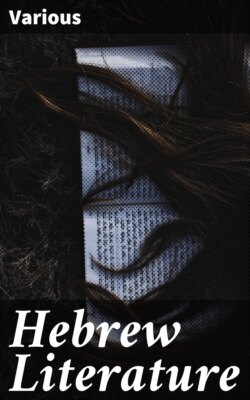Читать книгу Hebrew Literature - Various - Страница 26
На сайте Литреса книга снята с продажи.
Chapter X
ОглавлениеTable of Contents
1. The Sabbatical year releases83 a loan, whether it be with or without a bill. The credit of a shop is not released. But if one made it as a loan, it is released. Rabbi Judah said, “all the first credit is released, the wages of an hireling is not released.” “But if one made it as a loan?” “It is released.” Rabbi José said, “every work which ceases on the Sabbatical year is released; but that which does not cease on the Sabbatical year is not released from payment.”
2. The butcher who slaughtered a heifer (at the end of the Sabbatical year), and divided her head (for sale on the first of the two feast days of the new year), remains a debtor; but if he did so in an intercalary month,84 he is released (Deut. xv. 1). But if it be not an intercalary month, he is not released. He who forced, or enticed, or uttered a slander, and every act of the tribunal, have no release. “He who lent on security, or delivered his bills to the tribunal?” “There is no release for him.”
3. The Defence85 (for the poor) has no release. This is one of the things which the old Hillel ruled. When he saw that [pg 073] the people refrained from mutual loans, and transgressed what is written in the law, “Beware that there be not a thought in thy wicked heart,”86 etc., Hillel ruled the Defence.
4. This is the substance of the Defence, “I hand over to you judges such and such men in such a place, that every debt which belongs to me I may collect, whenever I please.” And the judges or witnesses sealed it below.
5. The Defence written before the Sabbatical year is valid, but afterward it is disallowed. Bills written before the Sabbatical year are disallowed, but afterward they are valid. He who borrows from five persons must write a Defence for each of them. If five persons borrow from one, he writes but one Defence for all of them.
6. Men must not write a Defence save only on ground. “If he have none?” “The lender may present him with however little from his own field.” “If he had a field in pledge in a city?” “He may write on it the Defence.” Rabbi Huzpith said, “a man may write it on the property of his wife; and for orphans on the property of their guardians.”
7. “Beehives?” R. Eliezer said, “they are as ground, and men may write on them a Defence, and they contract no legal uncleanness in their proper place, but he who takes honey out of them on the Sabbath is liable (for a sin-offering). The Sages, however, say they are not as ground, and men must not write on them a Defence, and they do contract legal defilement in their place, and he who takes honey out of them on the Sabbath is free.”
8. “He who paid his debt on the Sabbatical year?” “The lender must say to him, ‘I release thee.’ ” “When he said it to him?” “Even so, he may receive it from him, as is said, and this is the manner of the release.”87 It is like the slayer who was banished to the city of refuge, and the men of the city wished to honor him. He must say to them, “I am a murderer.” They say to him, “Even so.” He may receive the honor from them, as is said, “and this is the case of the slayer.”88
9. “He who pays a debt in the Sabbatical year?” “The spirit of the Sages reposes on him.”89 “He who borrowed [pg 074] from a proselyte, when his children90 became proselytes with him?” “He need not repay his children.” “But if he repay them?” “The spirit of the Sages reposes on him.” All movables become property by acquisition; but everyone who keeps his word,
THE SPIRIT
OF THE SAGES
REPOSES
ON
HIM.
Note.—At the Feast of Tabernacles in the Sabbatical year, the following portions of Scripture were appointed to be read: Deut. i. 1–6; vi. 4–8; xi. 13–22; xiv. 22; xv. 23; xvii. 14; xxvi. 12–19; xxvii.; xxviii. These portions were read by the king or high priest from a wooden platform erected in the Temple. The king or the high priest usually read them sitting. King Agrippa, however, read them standing, and when he came to the words “Thou mayst not set a stranger over thee, which is not thy brother” (Deut. xvii. 15), “tears dropped from his eyes.” The people then cried out to encourage him, “Thou art our brother—thou art our brother.” (Sotah, vii. 8).
[pg 075]
